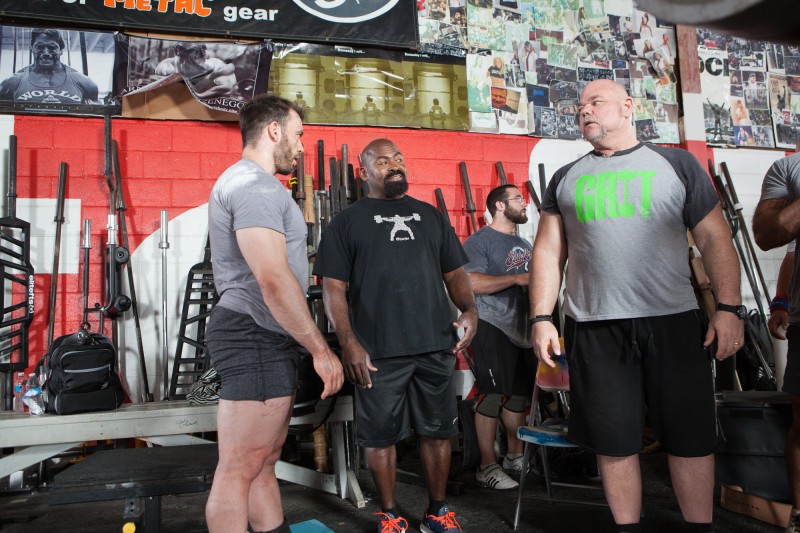
Every trainer and coach will experience a wide variety of client types throughout their career. While each of us is wired in a way that probably meshes up best with a certain type of client, it is unrealistic for most trainers to be selective and build a clientele of only that particular type of client. Instead, we need to be able to meet our clients where they need us and help them in the way they are paying us to. A good coach is someone who knows how to handle the uniqueness of each of their clients and make positive impacts on all of them. In this article, I discuss several different client types and how you as a coach should handle them.
Mr. Hype
This type of lifter feeds off of raw emotion. They go to the gym to get out their demons, and for them that means snorting salts, getting smacked in the face, putting on death metal at a deafening volume, and going for a PR deadlift attempt…at least once a week. This is the lifter type most likely to veer off the plan and try for a new squat max on a deload week because they had a bad day at work.
RECENT: How to Know If You Should Open a Gym
For a coach who is trying their best to make objective decisions, this type of client can be a handful. There are two things to take into consideration when coaching this type of client. First, it’s your job to understand your clients' need for training as an outlet and the need to push themselves. Second, it’s also your job to keep them from destroying themselves. In order to accomplish this, try keeping in some type of regular “balls out” training methods in at all times, but make sure it fits the overall goal of the training block you are in. This could be a heavy attempt for a new PR during a peaking phase or it could be a rep max during the “off-season.” Make sure you communicate with your client the program and when you plan to let them loose, so to speak. Usually, this type of client is willing to compromise trying to get a bloody nose every time they train if they know you’re setting them up for something big (and fun).
The Analytical Meathead
While Mr. Hype makes all his decisions from his heart (his emotions), the analytical meathead makes all his decisions with his brain. This is the lifter who will come to the gym with a laptop, accelerometer, and three cameras on tripods to capture their warm-up sets in order to determine whether or not to increase or decrease their working sets by 1.25%. This lifter loves data and they love the problem solving that goes into self-improvement. This lifter needs to see a full plan and know every detail of that plan so that they can prepare themselves. They might go off plan as well, but instead of a very emotional reason like Mr. Hype would give, they are going to give a very analytical one, like that their resting heart rate was 10% higher of lower that morning.
As a coach, this client might drive you crazy with a thousand questions. To you it is going to seem like they are questioning you, but truthfully they just want to gain a better understanding. This type of client is going to do a bunch of research on their own and is typically going to be well educated. With the analytical meathead the development of the training plan must be a collaborative process. Be willing to take a look at their data and listen to what they have to say. They might even have some good ideas and make your job easier.
Friendship, Guidance, Accountability
Why a client hires you as a coach can be based on a variety of factors but I have found that everyone falls into three basic categories: they are looking for a relationship with a coach, they need guidance, and/or they need accountability. Some clients fall into all three categories while others just fall into one.
Clients who want a relationship with their coach need communication. They don’t want to feel like another number on a spreadsheet. You can definitely set boundaries for this. Maybe you don’t give out your cell phone number or maybe you don’t spend time outside of the gym except in large gym group settings, but either way, developing a relationship with a client just means caring about them. Learn what they do for a living, ask them about their family, find out when their birthday is, and wish them happy birthday. It doesn’t take a whole lot of effort but to them it makes a world of difference.
WATCH: Table Talk — The Most Important Quality of a Great Coach
Some clients aren’t looking for a relationship; they just want someone to tell them what to do. They need you to lay out an action plan and they will execute. For this need, it is very important that you are organized. They are going to want clear instructions and to have those instructions in a timely manner. If they are supposed to train at 5 PM on Monday, they are going to be stressed out if you wait till 4 PM to get it to them. Make sure you can provide them with very clear instructions in a timely manner and they will have everything they need to go kick ass.
Other clients need accountability. They realize they lack some of the self-discipline needed to make certain changes in their lives and they rely on a trainer or coach to help make up for it. For this client, putting in a little extra effort can go a long way. It could mean texting them at night before a morning training session and reminding them to set their alarm, it could mean setting up an auto email or text to remind them to check in or track their food, or it could mean going to their house and throwing out any food that they shouldn’t be eating. These types of clients will be clients for life if you are able to help them achieve something they know they couldn’t achieve on their own.
As coaches and trainers, it is our job to understand our clients' needs and help address them. With the insight from this article, you should be more prepared to go out and do a better job of coaching each of your clients and having a positive impact on their lives.











